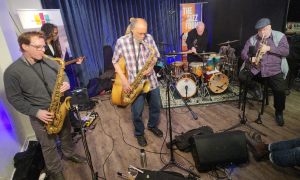Home » Jazz Articles » Live Review » Cecil Brooks III Trio at The Turning Point Cafe in Piermont, NY
Cecil Brooks III Trio at The Turning Point Cafe in Piermont, NY
He made the drums speak in a loud, profane, and complex dialect--a kind of funky Morse code.
The Turning Point Cafe
Piermont, New York
November 10, 2008
Whopping bass drum hits resonate in your central nervous system. Cymbal taps sound as gentle and ethereal as wind chimes. Intemperate blows to every part of the drum set somehow manage to swing. These are a few of the many voices of Cecil Brooks III. A headstrong, mercurial, and calculating performer, Brooks often tosses the band about like a boat in a hurricane, yet his rhythms have deep, solid roots. Even in Brooks' most tumultuous moments, he always provides a guiding thread that keeps the music from becoming too strident or descending into chaos.
Throughout two sets at The Turning Point Cafe, Brooks matched wits and wills with organist Pat Bianchi (a member of his working band), and house saxophonist John Richmond. Bianchi evoked the cozy side of his instrument on Thelonious Monk's, "Monk's Dream," the first set's opener. Brooks kept steady, undemonstrative jazz time, and added chattering snare accents as the organist began to build up steam. The drummer then jumped headlong into the rough, uncharted territory created by the Bianchi's rollicking waves of sound. The response to Bianchi's retreat into a more conventional stance was a solid, no-nonsense shuffle beat. Brooks' eight-bar exchanges with Bianchi contained startling differences. Whittling deliberate, studied snare strokes into recognizable phrases, his first maneuver sounded like it was in slow motion. During the next one, jackrabbit doubles to the snare executed by the left hand evolved into a flurry of crashed cymbals. The third deftly sketched a portion of Monk's melody.
The trio took "Bolivia," Cedar Walton's near-classic composition, for a wild and bumpy ride. After a traditional treatment of the head and the measured, easygoing beginning of Bianchi's solo, Brooks deliberately deconstructed the music with a jumble of polyrhythms. His bass drum served as a shifting, uneven anchor as the organist unleashed long, abstract swells. Richmond followed by going back in the direction of Walton's tune. When Brooks' bluntly swinging beats posed a challenge, the tenor saxophonist turned nasty and primitive, spewed forth a number of stark phrases in retaliation. Brooks' solo featured hard, slapping, African-influenced rhythms, augmented by the persistent click of the hi-hat cymbals. He made the drums speak in a loud, profane, and complex dialect—a kind of funky Morse code.
The standard "Detour Ahead" brought out a more sensitive, understated side of the trio. Working different registers of the horn, Richmond thoughtfully delineated the melody, beginning a cogent, improvised tale with juxtaposed foghorn tones and terse, higher-pitched notes. Richmond's sound gradually became broader and more expansive, and he deftly integrated portions of the song. Throughout, Brooks offered unobtrusive support. Working off of the drummer's steady ride cymbal, Bianchi was cool and calculated, letting things breathe even during some rapid passages.
Initially referred to by Richmond as "a medium tempo ballad," his composition "Equal Knocks" quickly turned into another friendly test of wills. Subsequent to the composer's pleasant, song-like opening, Brooks' pounding tom-toms demanded a response. Almost immediately, Richmond's tenor became more forceful. He shot out some thick tones, rammed one long phrase against the beat, and bowled over Brooks and Bianchi before lapsing into silence. Brooks' sensible tom-tom and ride cymbal combinations initially accompanied Bianchi's earnest lines. Impervious to a sudden rash of thrashing beats, the organist sounded like a massive, swinging carnival, and eventually built to a satisfying chordal climax.
The hookup between Brooks and Bianchi reached vertiginous heights on Dizzy Gillespie's "A Night In Tunisia," the penultimate selection of the second set. Not unlike most of their earlier tussles, this one started civilly when Bianchi constructed a series of levelheaded lines. Brooks started to push very hard. The organist executed a rapid, speech-like pattern, and then went into free fall. It seemed as if each one of his phrases existed on its own. At one point Bianchi intimated the sound of dominoes falling; later on, three notes repeated like a stuck record.
Played on only the cymbals, Brooks' solo initially parceled out tidy, comprehensible segments. Sometimes they sounded like the ringing of tiny bells; in other instances, harder pitter patter hinted at straight jazz time. Consistently making connections between groups of strokes, Brooks slowly brought the volume down before sounding out odd, muted tones. A second of silence was shattered by the raucous bashing of the entire drum set. Amidst the clamor, he executed recognizable rock and funk patterns. Never mind that the band returned to play the head—or, for that matter, performed one more tune. Brooks already had the last word.
Tags
PREVIOUS / NEXT
Support All About Jazz
 All About Jazz has been a pillar of jazz since 1995, championing it as an art form and, more importantly, supporting the musicians who make it. Our enduring commitment has made "AAJ" one of the most culturally important websites of its kind, read by hundreds of thousands of fans, musicians and industry figures every month.
All About Jazz has been a pillar of jazz since 1995, championing it as an art form and, more importantly, supporting the musicians who make it. Our enduring commitment has made "AAJ" one of the most culturally important websites of its kind, read by hundreds of thousands of fans, musicians and industry figures every month.
























